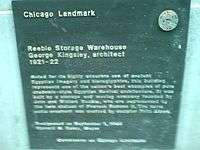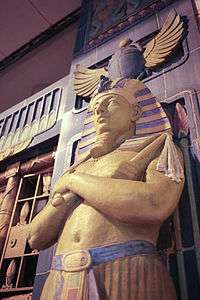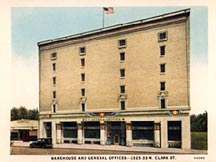Reebie Storage Warehouse
|
Reebie Storage and Moving Co. | |
|
Postcard of the Reebie Storage and Moving Co., ca. 1922 | |
| Location | Chicago, IL |
|---|---|
| Coordinates | 41°55′28.26″N 87°38′22.81″W / 41.9245167°N 87.6396694°WCoordinates: 41°55′28.26″N 87°38′22.81″W / 41.9245167°N 87.6396694°W |
| Built | 1922 |
| Architect | George S. Kingsley |
| Architectural style | Egyptian Revival |
| NRHP Reference # | 79000828 [1] |
| Significant dates | |
| Added to NRHP | March 21, 1979 |
| Designated CL | September 1, 1999 |
The Reebie Storage and Moving Co. was built for the Reebie Storage and Moving Co. in Chicago, Illinois, in 1922. Located at 2325 North Clark Street #300 in the Lincoln Park neighborhood, it is a widely recognized example of Egyptian Revival architecture. It was named to the National Register of Historic Places on March 21, 1979,[2] and was designated a Chicago Landmark on September 1, 1999.[3]
Architect George Kingsley (1870-1956) and sculptor Fritz Albert designed the warehouse. Albert was responsible for the exterior's terra cotta ornamentation. The moving company founders, John and William Reebie, are represented by the two statues of Ramses II that flank the main entrance. William Reebie (1859-1921) founded the company in 1880. The Reebie brothers wanted a building in a distinctive style, and John Reebie had seen another Egyptian Revival storage building in Stockton, California (designed in 1918 by Glenn Allen for the Dawson-Mayflower Moving Company). John Reebie had also visited Egypt at some time before 1921 as well.



See also
References
- ↑ National Park Service (2007-01-23). "National Register Information System". National Register of Historic Places. National Park Service.
- ↑ National Register of Historical Places - Illinois (IL), Cook County. National Register of Historic Places. National Park Service. Retrieved 2007-06-03.
- ↑ "Reebie Storage Warehouse". City of Chicago. Retrieved 2007-06-03.
| Wikimedia Commons has media related to Reebie Storage Warehouse. |
